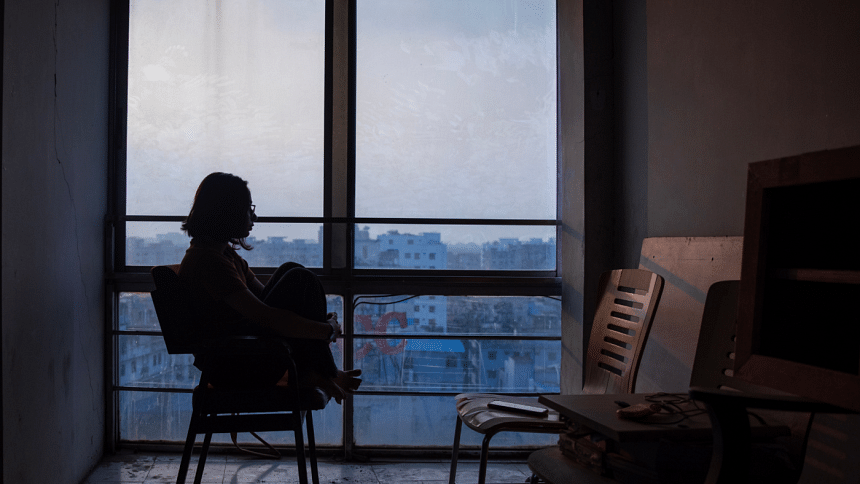Survivors of the Milestone jet crash and the road to emotional recovery

On July 21, shortly after a Bangladesh Air Force fighter jet crashed within the premises of Milestone College in the Diabari area of Uttara, a deeply distressing video began circulating on social media. Filmed from inside the campus moments after the crash, the footage captured scenes of chaos—students, parents, staff, and passers-by running in fear and confusion.
Among the heart-wrenching visuals was a Milestone student desperately trying to help another injured student lying on the ground. At the time of writing, this publication has not been able to independently confirm the condition of the injured student. Yet, the image of a young child, forced to confront such horror and tend to a friend or peer in such a tragic moment, is extremely saddening.
That same day, in an interview with BBC Bangla, Farhan Hasan, a student of class ten of Milestone College, recounted his harrowing experience. Farhan had just stepped out of his classroom, chatting with friends after finishing an exam, when the jet crashed into the school grounds.
"The burning plane was hitting the building right in front of my eyes," Farhan told BBC Bangla. "My best friend, the one I was in the exam hall with, died right in front of my eyes."

For young people like Farhan, and many others far younger than him, witnessing such an unimaginable tragedy leaves scars that, although not visible to the naked eye, run deep. The shock of seeing friends injured or lose their lives in a place they once considered safe can shatter their sense of security, creating emotional wounds that may take years to heal.
"After any traumatic event, especially one as monumental as this one, it is expected that a person will experience stress. And if the survivor is a child, the impacts may be more severe. Primarily, we observe the child experiencing acute stress, anxiety and feelings of insecurity. They often relive the events through flashbacks. After about 1.5 months to 6 months, it may even develop into PTSD (Post Traumatic Stress Disorder), personality disorders, or even long-term depression," says Dr Helal Uddin Ahmed, Professor of Child, Adolescent and Family Psychiatry at Faridpur Medical College.
As per research published in the European Journal of Trauma & Dissociation, children who experience severe trauma often struggle with low self-esteem, persistent anxiety, and depression. While some try to suppress or deny the memory of their trauma, others build a false sense of self to mask the pain, sometimes turning to unhealthy means of coping.
"If a child develops any of the long-term impacts, such as PTSD, personality disorders, or long-term depression, the child will experience functional impairment. Meaning that their educational prospects, career prospects and even interpersonal relationships may be hampered in the long run. Some people may even develop self-harming tendencies. This is not to say that all survivors would exhibit the same symptoms or experience the same mental health issues. However, those who do develop long-term issues may develop tendencies to keep to themselves, isolate themselves socially, and be hyper aware of themselves in the long run," added Prof. Helal.
In the wake of the Milestone tragedy, survivor's guilt is another matter that needs our attention. Survivor's guilt is a painful feeling of questioning why they survived when their friends, classmates, acquaintances, or anyone else they knew did not. Survivor's guilt can weigh heavily on children, often leaving them withdrawn or struggling to find meaning in everyday life.
Analysis from a research paper published in the Journal of Traumatic Stress Disorders & Treatment identifies three key themes among those experiencing survivor's guilt: persistent guilt and disentitlement to life, trying to make sense, and a need to repair.
The findings revealed that many survivors remain trapped in a painful cycle of trying to understand why they lived while others did not. At the heart of this struggle lies a persistent sense of guilt—an overwhelming feeling of being undeserving of life. This guilt fuels both the internal battle of making sense of their survival and the external efforts to find ways to "make amends" or seek repair, often leaving them emotionally burdened and unable to move forward.
Following a life-altering event such as this, it is crucial that parents, teachers and loved ones look out for certain signs and symptoms in the survivors. While many could reach out to those around them for support, many children may find themselves at a loss for words when trying to convey their feelings of grief and anxiety.
When speaking of what kind of behaviour one should look out for around the survivors, Prof. Helal mentioned, "The most common sign would be sleep disturbances. That could be trouble falling asleep, or trouble remaining asleep. The second most common symptom would be a deficit of attention in these children. They may be distracted from their studies or remain absent-minded for prolonged periods. One may also observe a general behaviour pattern exhibiting signs of agitation or anxiety. In some cases, they may also stop taking care of themselves, or lose interest in their hobbies."
He further mentioned the possibility of some physical symptoms, such as a tendency for bedwetting even after they had already grown out of it, or intense nausea and vomiting. It is also possible for those affected to exhibit signs of dissociation, where they struggle to recognise close ones or even themselves in certain cases.
The weight of the loss that the survivors have collectively endured cannot be erased from their minds, nor can we take away the grief they are yet to learn to live with. However, what we can offer those affected by the event is utmost consideration and support.

When we asked Prof. Helal how we, the loved ones, the teachers, the institutions, and the communities around them, can support those that have been afflicted, he said, "As crucial as it is to ensure good healthcare and safe and supportive households to the survivors, it is equally crucial that they also receive the luxury of quality time with their parents, families and loved ones. This may be through increased playtime or better avenues of accessible communication, which would ultimately lead to them having a safe space to express their grief. It is also extremely important that parents do not pressurise their children to resume their studies and other regular activities just because they may not have necessarily been physically harmed."
He also added, "Disturbing photos of the events must be kept away from the victims (those directly or indirectly affected) as well. Allowing them space to express their feelings of grief is of utmost importance. They must also be steered towards looking forward to positive events in the near future. Immediately, there is a need for basic sensitivity training for those in direct contact with victims and survivors. But overall, we as a people must develop a culture of sensitivity."
As a society, we have developed a tendency to pour out all our thoughts, emotions, theories, and perceptions into online spaces. To some, it may be a way to cope with trauma, and to many, it is part of a regular, memorised routine. For the sake of those still with us, we must create a clean, safe online space. It is crucial that we, as a community, move away from damaging practices of making content out of whatever happens around us. Those afflicted deserve our respect and empathy, and the best way we can offer these to them is through respectful space and mindful use of our shared online spaces.
References:
1. BBC (July 21, 2025). 'My friend died right in front of me': Student describes moment air force jet crashed into school.
2. European Journal of Trauma & Dissociation (February 2022). The impact of childhood trauma on children's wellbeing and adult behavior.
3. Journal of Traumatic Stress Disorders & Treatment (March 13, 2018). Living a Life That Should Not Be Lived: A Qualitative Analysis of the Experience of Survivor Guilt.


 For all latest news, follow The Daily Star's Google News channel.
For all latest news, follow The Daily Star's Google News channel. 









Comments